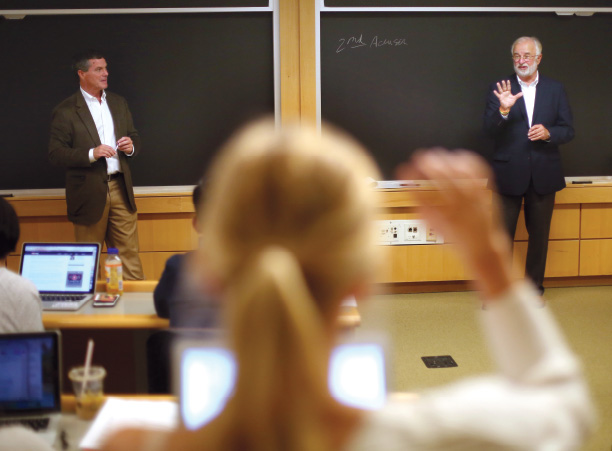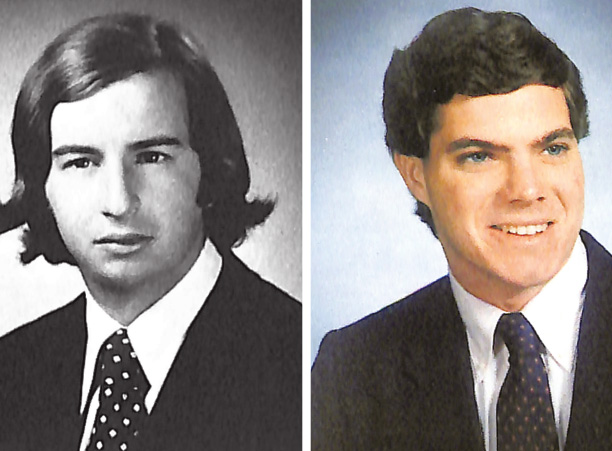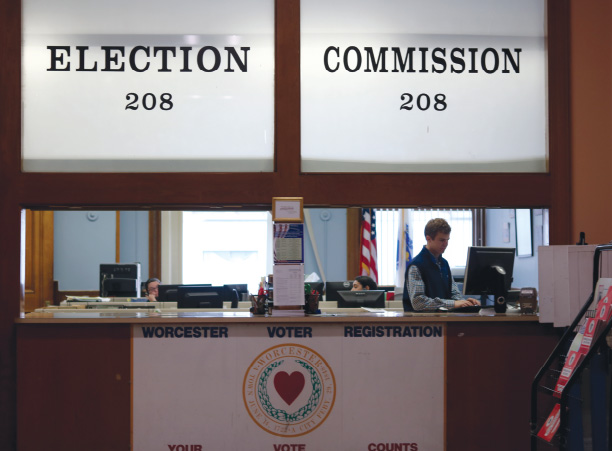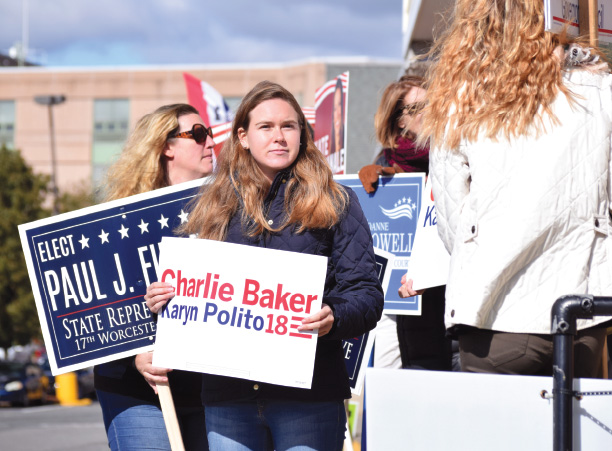
The advertisement starts with a video of Hillary Clinton on stage. "If you look at the map of the United States, there's all that red in the middle where Trump won," she says. The video is intercut with images of Missouri's Democratic Senator Claire McCaskill proudly endorsing Clinton, as Clinton goes on to describe Trump supporters as racist and sexist. The kicker flashes in block red letters on screen: "This is what Claire McCaskill and her 'President' think of you." It ends with the logo for Josh Hawley, McCaskill's Republican opponent in the 2018 midterms.
"Who thought that was a very powerful ad?" asks former Democratic congressman Timothy "Tim" Bishop '72, standing in front of a Smith Labs lecture hall of more than 20 Holy Cross students. Nearly every hand goes up. He agrees: "I thought that was a very powerful ad."
"A lot of this stuff is poll-driven," explains Peter Flaherty '87. "The strategists sitting in the room got a poll back that tested Hillary Clinton's favorability in the state of Missouri, and that's the reason an ad like this got put on the air." He should know — as a longtime political consultant, he's run campaigns for Mitt Romney, Scott Brown and other Republican candidates, often being the one to make decisions about what ads to air and where to spend resources.
Students in the Academic Internship Program course Campaign 2018: A Hands-On Approach spent the fall semester combining hands-on learning as interns in area local, state and national political campaigns with a weekly seminar co-taught by Bishop and Flaherty. In addition to getting real-world experience in races culminating in the November midterms, the students had the ear and expertise of two veterans of the national political scene.
As distinguished visiting lecturers in the J.D. Power Center for Liberal Arts in the World, the men brought a unique combination of experience from both sides of the aisle to bear in teaching students how to analyze 2018's contentious elections in real time and without bias. They did this without the all-too-common partisan bickering, keeping the focus on critical thinking and strategy rather than ideology, helping students understand everything that goes into building and running a political campaign. "This is not like watching two pundits scream at each other on cable news," says Daniel Klinghard, director of the J.D. Power Center. "They are very polite and very civil even when they disagree. It's a great model, and they are both really good at it."
Lives of Public Service
 (from left) Tim Bishop '72 and Peter Flaherty '87. Photo courtesy of Holy Cross Archives
(from left) Tim Bishop '72 and Peter Flaherty '87. Photo courtesy of Holy Cross ArchivesAs the U.S. representative for New York's 1st Congressional District, he was a firm adversary of President George W. Bush's conservative policies, opposing the Iraq War and tax cuts for the wealthy, and supporting the formation of President Obama's Affordable Care Act. "Being a member of Congress is the best job in the world," he enthuses. "You get a seat at the table for national issues that are going to influence millions of people for decades to come, but you also get to play a role in bringing the federal government to bear to resolve local problems."
Flaherty, meanwhile, was a district attorney in Boston for a dozen years, including several prosecuting homicide cases. Asked by Romney to consult on legal issues during his first run for governor of Massachusetts, Flaherty became one of his closest advisers, offering input on issues such as marriage equality and stem cell research. As Flaherty began running campaigns for candidates, he made the connection to his former career by thinking of the electorate as a giant jury pool, to which he had to make his best case. "My work as a prosecutor really helped me understand human nature," he says. "When I am in the living room of a family who just lost a loved one, no one would ask if I was a Republican or a Democrat. The things that are important to people, like education, health care or public safety, should rise above party affiliation and politics."
Over the years, Bishop and Flaherty have returned to Mount St. James several times to give lectures and workshops on politics. When Bishop was on campus last spring to talk about his experience as a congressman, he began talking with Political Science Assistant Professor Greg Burnep '09 about coming back in a more formal capacity. Burnep quickly saw this as a good opportunity for the J.D. Power Center, and brought Klinghard into the conversation. The trio discussed several ideas before settling on an Academic Internship Program course centered around the midterm elections. It would be offered under the auspices of the center, which was created to foster opportunities for experiential learning, in which students marry their classroom education with hands-on experience.
"More than ever, students need to be able to demonstrate coming out of college that they have some kind of practical experience," Klinghard says. "It used to be you got hired on a job and they'd give you a training period of six months to a year. They don't do that so much anymore."
 Bobby Tuzzio '20 stands at the Worcester Election Commission, where he interned as part of the course. Photo by Rebecca Blackwell '16
Bobby Tuzzio '20 stands at the Worcester Election Commission, where he interned as part of the course. Photo by Rebecca Blackwell '16With midterms typically serving as a referendum on the sitting president, Bishop and Flaherty started each class by examining whether it was a good, bad or neutral week for the president. "Some people who are not Trump supporters might say, 'The Judge Kavanaugh hearings were outrageous,'" Flaherty says. "'But as much as I don't like to admit it, in the court of public opinion, it was probably good for Trump.'"
They further helped students drill down into what has made campaigns successful with books such as "The Thumpin'" by Naftali Bendavid, which details how Rahm Emanuel helped Democrats win the 2006 midterms, and "The Great Revolt" by Salena Zito, which explains how Donald Trump won the presidency. "It's absolutely required reading for anyone wanting to figure out the Trump phenomenon," Bishop notes.
Over the course of the fall, Zito joined a slate of high-profile guest speakers in the class that included David Axelrod, chief strategist for Barack Obama's presidential campaigns, and Chris Matthews '67, political commentator, MSNBC talk show host and author.
Keeping Track
Outside the classroom, students were divided into pairs to track specific congressional races, each team examining one Senate race and two House races that might be crucial to the outcome of the national election. Bishop and Flaherty encouraged students to look beyond polls and fundraising numbers to examine the issues on the ground.
"You can't get all of your news from CNN or Fox or Politico," Flaherty says. "If you have an Iowa race, you need to go to the Des Moines Register and see what the local issues are." For example, a district that voted heavily for Trump in 2016 might have a manufacturing plant closing that residents blame on the president. "This is not just 'Make America Great Again' — this is 'Make Worcester Great Again' or 'Make Des Moines Great Again,'" he notes.
For Bobby Tuzzio '20, the intense campaign analysis changed the way he views politics. "Senate races are really judged on how the president is doing, but House races are based more on how a district feels," he says. "It caused me to focus more in terms of how campaigns were run rather than party ideology."
The pair also emphasized the importance of looking at national or local events that fall outside of candidates' control that might have bearing on the races. "We told them, 'You can't let a week go by — so much happens,'" Flaherty says.
Case in point, Carter Mitchell '19 was impressed by the influence Hurricane Michael had on the Florida Senate race she was tracking. From his position as sitting governor, candidate Rick Scott was able to display a strong response to the storm, narrowing the race with incumbent Senator Bill Nelson. "They can plan for the debates and how they present themselves, but it's interesting to see how the candidates react to a natural disaster that is out of their control," Mitchell says.
The outside event that probably affected candidates most was the Judge Brett Kavanaugh hearings, in which the Supreme Court nominee faced charges of sexual harassment by his high school acquaintance. "You now have three incumbent Democrats who will probably lose their seats because they voted against Kavanaugh," Flaherty said before the election, correctly predicting the electoral demise of senators Heidi Heitkamp in North Dakota, Joe Donnelly in Indiana and McCaskill in Missouri.
Despite the intensity of emotion around that issue, Flaherty and Bishop took pains to keep class discussions from spiraling. "We set the tone early in the first week, saying this is a uniquely polarized climate, but there is a way to put all of the facts out there and talk about them in an educated and informed way, as long as we are respectful of each other — and maybe sometimes we will even persuade each other," Flaherty says.
"We are both nice people and people who are inclined to approach issues collegially. We are not people who view those who disagree with us as our enemies," Bishop agrees. "We are all prisoners of our own experience and we all bring our own values to the table, but we certainly encourage fact-based assessments and evaluating what our leaders say against reality."
The visiting lecturers modeled that behavior in their own debates. "You could tell the professors disagreed and sided with their own parties, but they never got heated or went after each other," Mitchell says. During debate around Kavanaugh, for example, they were always careful to bring it back to the effect on the election. "They would ask, 'How did a senator vote and why?'" she says. "For example, why did Senator Manchin vote yes and how will this help or hurt his political future?"
In the Field
 Carter Mitchell '19 holds a sign for Governor Charlie Baker. Photo by Jane Carlton
Carter Mitchell '19 holds a sign for Governor Charlie Baker. Photo by Jane CarltonTuzzio eschewed partisan lines to work at the Worcester Election Commission with Assistant City Clerk Niko Vangjeli '13. Among other tasks, Tuzzio visited community centers, college campuses and homeless shelters to register new voters, impressed with the energy he saw on both sides. "It was great to see so many people out there who were talking about change and wanting to shape our nation's future," he says.
Klinghard was careful to ensure that internships would be more rigorous than just volunteering for the campaigns, and students would also be able to sit in on strategy and planning sessions. But, out of necessity, the internships included a fair amount of phone banking and door knocking as well — itself an education in what it takes to win. "You gain an appreciation for just how hard you have to work on a campaign," says Mitchell, who interned with the Baker campaign.
On one of her first door-knocking outings, she and her partner had an unexpected encounter that showed just how important it is for campaigns to avoid taking anything for granted. "We went down a dirt path where a man in his 60s was doing yard work," she recalls. "He told us he was a registered Democrat, but he voted for Baker in 2014." Impressed by the governor's work on transportation and the opioid crisis, the man said he would probably vote for Baker again in the midterms. "It was refreshing to see that just because you are a lifelong Democrat, you don't have to vote for that party all the time," she says. "It showed that what we were learning in class about hearing out others and not disregarding their opposing beliefs can translate into campaigns as well."
Bishop and Flaherty hope that combination of roll-up-your-sleeves practicality and big-picture thinking has given students a new appreciation for democracy, not just for the midterms, but for future elections. "In order to be an informed and responsible citizen, I believe that people at a minimum must be politically aware and better than that is being politically active," Bishop says. "Becoming aware of issues and how they affect campaigns encourages people to go from awareness to action."
That awareness doesn't have to necessarily be ideological, Flaherty adds, making the point by quoting John F. Kennedy: "He said, 'Our most basic common link is that we all inhabit this planet. We all breathe the same air. We all cherish our children's future. And we are all mortal.'
"I've been to every state over three presidential elections, and for the most part, everyone does want the same things out of life — they want the best for their kids and for themselves so they can provide for their kids," he continues. "If everyone would take a step back and look at politics through that lens, it might lend itself to a much more civil and productive discourse."
Written by Michael Blanding for the Winter 2019 issue of Holy Cross Magazine.
About Holy Cross Magazine Holy Cross Magazine (HCM) is the quarterly alumni publication of the College of the Holy Cross. The award-winning publication is mailed to alumni and friends of the College and includes intriguing profiles, make-you-think features, alumni news, exclusive photos and more. Visit magazine.holycross.edu/about to contact HCM, submit alumni class notes, milestones, or letters to the editor.

